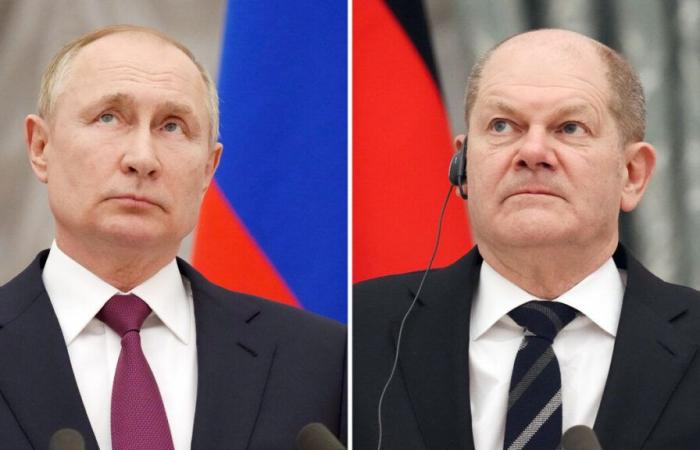The German Chancellor announced in mid-October that he was ready to renew contact with Vladimir Putin to try to put an end to the war in Ukraine. It's done. Olaf Scholz and the Russian president spoke by telephone this Friday for the first time in almost two years, a German government source announced.
VideoWar in Ukraine: Emmanuel Macron calls on Europe to “bear the burden of its own security”
“German Chancellor Olaf Scholz spoke on the phone with Russian President Vladimir Putin for an hour on Friday,” the source said. During this interview, he urged the Russian president to withdraw his troops from Ukraine and negotiate with kyiv.
According to the Chancellery, the German head of state urged Russia to demonstrate “willingness to begin negotiations with Ukraine with a view to a just and lasting peace” and underlined “the unwavering commitment of the EU towards Ukraine. To which Vladimir Putin responded that a peace agreement should take into account “new territorial realities”, thus calling for concessions from kyiv on the regions currently occupied by the Russian army.
“Potential agreements must take into account the security interests of the Russian Federation, be based on new territorial realities and, above all, address the root causes of the conflict,” according to a Kremlin press release summarizing Vladimir Putin's remarks. during this telephone interview with Olaf Scholz.
Putin isolated since 2022
Olaf Scholz declared on October 16 before the deputies of the Bundestag that the time had come for Germany “to do everything, in addition to clearly supporting Ukraine, to find a way to prevent this war from continuing”, including discuss with Vladimir Putin, something the leader had refused to do since December 2022.
“There will never be decisions taken over Ukraine’s head,” he promised. This is why before this interview, the German head of state also spoke with the Ukrainian president, Volodymyr Zelensky, indicated this same German government source. The Kremlin has not yet communicated about this telephone interview.
President Putin has not spoken with most Western leaders since 2022, when the EU and the United States imposed massive sanctions against Russia after the invasion of Ukraine. Many Western leaders – Joe Biden, Emmanuel Macron, etc. – with the notable exception of Hungarian Prime Minister Viktor Orban, refuse to speak to the Russian president.
At the beginning of November, Vladimir Putin regretted that Western leaders had “stopped” calling him. “If one of them wishes to resume contacts, I have always said it and I want to repeat it: we have nothing against that,” he said at the Valdai forum, in Russia.
A difficult context for Ukraine
The German leader is under pressure from part of public opinion over the continuation of the conflict in Ukraine, now in its third year. Strengthened since the regional elections across the Rhine, the opposition, including the far-right Alternative for Germany (AfD) party, as well as part of the left, is calling in particular for an end to arms deliveries to kyiv.
Since Russia's invasion of Ukraine began on February 24, 2022, Germany has been the largest arms supplier to kyiv after the United States. This conversation comes in a very difficult context for Ukraine, which is preparing to experience its third winter under fire from Russia, with much of its energy infrastructure damaged or completely destroyed.
With Donald Trump's American presidential victory, the question arises of the sustainability of American support, which has enabled Ukraine to resist Russian troops since February 2022.






